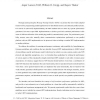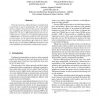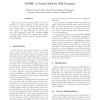138
click to vote
ICPP
2009
IEEE
14 years 11 months ago
2009
IEEE
The emergence of multicore processors raises the need to efficiently transfer large amounts of data between local processes. MPICH2 is a highly portable MPI implementation whose l...
120
click to vote
TPDS
2010
15 years 11 days ago
2010
Message passing using the Message Passing Interface (MPI) is at present the most widely adopted framework for programming parallel applications for distributed-memory and clustere...
103
click to vote
SBACPAD
2004
IEEE
15 years 3 months ago
2004
IEEE
This paper presents a high performance communication system based on generic programming. The system adapts itself according to the protocol being used on communication, simplifyi...
125
click to vote
PVM
2004
Springer
15 years 7 months ago
2004
Springer
Abstract. A large number of MPI implementations are currently available, each of which emphasize diļ¬erent aspects of high-performance computing or are intended to solve a speciļ¬...
113
click to vote
PPAM
2005
Springer
15 years 7 months ago
2005
Springer
Abstract. A large number of MPI implementations are currently available, each of which emphasize diļ¬erent aspects of high-performance computing or are intended to solve a speciļ¬...
IPPS
2005
IEEE
15 years 7 months ago
2005
IEEE
While previous work has shown MPI to provide capabilities for system software, actual adoption has not widely occurred. We discuss process management shortcomings in MPI implement...
131
click to vote
PVM
2007
Springer
15 years 8 months ago
2007
Springer
Abstract. The MPI Standard does not make any performance guarantees, but users expect (and like) MPI implementations to deliver good performance. A common-sense expectation of perf...
142
click to vote
APCSAC
2007
IEEE
15 years 8 months ago
2007
IEEE
MPI (the Message Passing Interface) continues to be the dominant programming model for parallel machines of all sizes, from small Linux clusters to the largest parallel supercomput...
111
click to vote
IPPS
2009
IEEE
15 years 8 months ago
2009
IEEE
MPI is the main standard for communication in high-performance clusters. MPI implementations use the Eager protocol to transfer small messages. To avoid the cost of memory registr...



